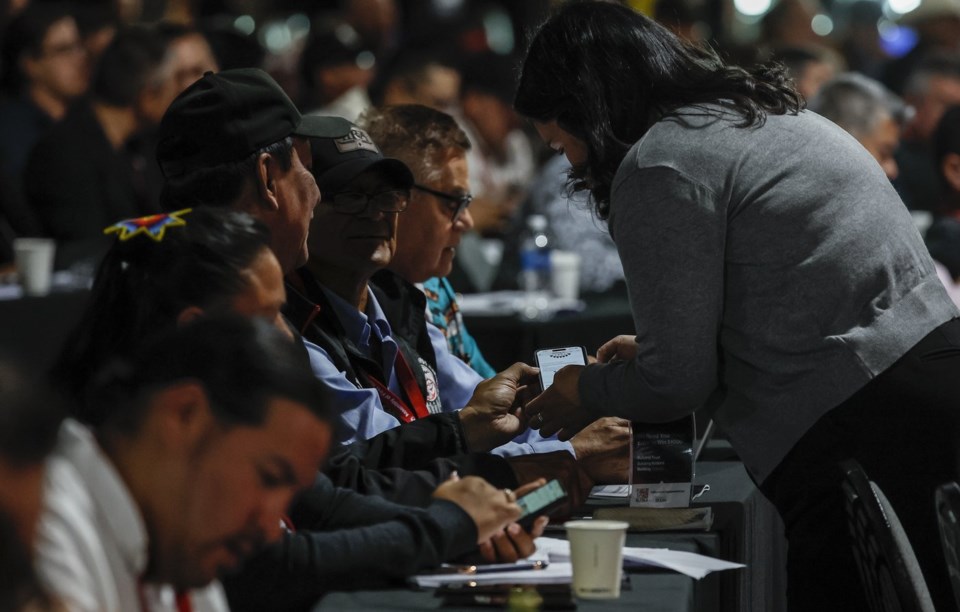OTTAWA — First Nations chiefs voted Friday to call on Ottawa to crack down on the people selling drugs that are claiming lives in their communities.
They're also calling for the Assembly of First Nations to declare a state of emergency spanning all First Nations, and to call for more support from the federal government for treatment and prevention.
Chief Angela Levasseur of Nisichawayasihk Cree Nation said she brought the resolution forward for a vote at the Assembly of First Nations annual general meeting in Winnipeg because the opioid epidemic is killing members of her community.
"In Manitoba and across Canada, fentanyl poisonings are taking lives daily. Our front-line workers and families are doing all they can, but support from federal and provincial governments remains fragmented, underfunded and reactive," Levasseur said.
Joseph Fourre, whose son died of fentanyl poisoning after consuming what he thought was ecstasy, spoke alongside Levasseur as they urged chiefs to support the resolution.
He said the RCMP told him that because his son consented to consuming ecstasy, there was no way to hold anyone criminally accountable for his death.
"Our communities are being deliberately targeted by traffickers who exploit the gaps in the law," Fourre said.
"Let us be clear, this resolution is a call for justice, accountability and urgent action. We believe a state of emergency must be called."
Fourre said "Harlan's Law," named after his son, would take on the drug traffickers exploiting First Nations communities.
The proposed law would sentence drug traffickers to a minimum of 15 years in cases where death occurs from tainted drugs, and give law enforcement the authority to access victims' cellphones to find out where the drugs were purchased.
Friday's resolution, which passed with 100 per cent support and just two abstentions, also called on the Assembly of First Nations to advocate for federal resources to confront the root causes of drug use, with a focus on prevention, intervention and rehabilitation.
Conservative Leader Pierre Poilievre expressed support for the proposed legal change during an unrelated press conference on Parliament Hill Friday.
"All of the chiefs that I have talked to have the common sense solution — they want to ban the drugs, lock up the drug dealers and provide treatment and recovery services to their members," Poilievre said, while criticizing what he called the Liberal government's "soft penalties."
Justice Minister Sean Fraser's office did not immediately respond to a request for comment.
The Assembly of First Nations called for action to address the opioid epidemic in First Nations in 2016.
Several chiefs told the AFN annual meeting Friday that while their communities have issued local states of emergency, they lack the tools to tackle the problem — and outside police forces aren't keen to help.
Some chiefs said that when they expel someone from their communities through a band council resolution, local RCMP officers tell them they don't have the jurisdiction to enforce it, leaving them with no way to remove people they deem to be threats to community safety.
During a panel discussion at the annual meeting Thursday, several First Nations leaders said the problem has only worsened since the pandemic.
"Families are torn apart, two children are left without parents, and our social fabric is broken," said Cold Lake First Nations Chief Kelsey Jacko.
"The scale of this crisis demands immediate, co-ordinated federal action. Piecemeal funding and short term pilots are not enough. The federal government has both fiduciary and treaty obligations to act."
During the three-day long assembly, chiefs also voted down resolutions related to the federal government's major projects legislation and supported continuing negotiations with Ottawa to reform the First Nations child welfare system.
This report by The Canadian Press was first published Sept. 5, 2025.
Alessia Passafiume, The Canadian Press



